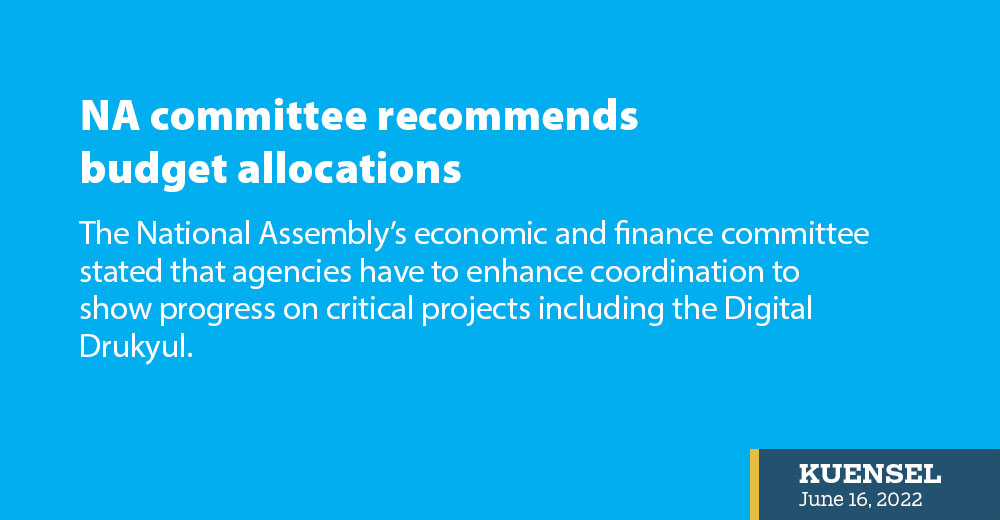Dechen Dolkar
The National Assembly’s economic and finance committee stated that agencies have to enhance coordination to show progress on critical projects including the Digital Drukyul.
The committee’s chairperson, Kinga Penjor presented observations and recommendations on Digital Drukyul, the industry and service sector, balance of trade and the laying of granular sub-base (GSB) on roads yesterday.
The committee acknowledged that the budget for the financial year as proposed by the government is well justified as it would ensure macro-economic stability, smooth transition and revival of economic growth.
However, the committee stated that there was a lack of cooperation and coordination among the relevant agencies which hinder achieving the government’s objectives.
Kinga Penjor said that the committee felt that it is also important to involve the private sector in the projects. He said that the individual agencies are developing their own applications in silos.
There are eight major projects which include a government-initiated network, enhancement of ICT sectors capacity and capability, integrated citizen services, digital school, national digital identity, integrated business licensing system, electronic patient information system (EPIS) and Bhutan Integrated Tax System (BITS).
The chairperson said that out of eight projects only six can be completed within the 12th Plan. BITS and EPIS will not be completed in the current Plan.
Health Minister Dechen Wangmo said that the five modules are developed with USD 4 million grant. The module includes patient registration, clinical services, supply chain management and clinical human resources.
Lyonpo said that all of the modules are almost ready and will be piloted before it is rolled out.
“From next month the pilot phase will begin. If the services go well, it will be rolled out in all hospitals,” Lyonpo said.
The patient history is also digitised at JDWNRH by training around 200 youths.
The committee recommended that the DITT be made the nodal agency to coordinate, facilitate, and appoint IT professionals to different agencies with the objective to achieve the collective mandate of digital governance and transformation.
Opposition Leader Dorji Wangdi said that the Digital Drukyul project has been there since the first government’s tenure providing around 300 services online.
He said that it would not be possible for the nodal agency to control all the projects and if they could also discuss with the Royal Civil Service Commission.
Finance Minister Namgay Tshering said that there has been coordination among the agencies while developing the apps. The government mainly focuses on harmonisation, integration and one portal service.
“They also consult with DITT for clearance but it is not possible to coordinate all the projects since nodal agencies don’t have experts to develop apps for tax and health,” the minister said.
The total budget outlay for the Digital Drukyul is Nu 2,676M. The total expenditure as of May 31, 2022 is Nu 1,361.77M, accounting for 50.89 percent of its total budget and the overall physical progress is observed at 64.33 percent.
MP Ugyen Wangdi said since only about 50 percent of the budget is spent and about 60 percent of the work is completed so far who will be taken to account. “Will the delay of projects be blamed on the consultant or the government?”
The committee also observed the industry and service sectors are still found to be dormant and in need of further support through policy interventions.
The committee recommended further easing Covid-19 restrictions to increase the inflow of tourists and foreign workers in the country.
In the past few years, the committee observed hindrance in exports, specifically agriculture produce. Subsequently, imports exceeded exports by Nu 32 billion in 2021. “Overall, the economy is facing challenges of increasing imports contrary to the exports,” Kinga Penjor said.
The committee recommended the economic affairs and agriculture ministries coordinate effectively to enhance exports, specifically the agricultural produce.
Further, the committee also recommended the ministries jointly devise a plan for import substitution for both essential and non-essential items.
The committee states that the allocation of Nu 3,190.562M, for the financial year 2022-2023 for the second phase of laying GSB across the country is expected to further contribute to uplifting the rural economy.
The committee recommended the government provide budgets targeted to chiwogs for the second phase of GSB, removing the performance-based condition.
The committee recommended that GNHC in collaboration with MoWHS frame guidelines for the future farm road constructions and GSB surfacing based on gradient, weather and other conditions.
The House will continue deliberation on the Bill today.


